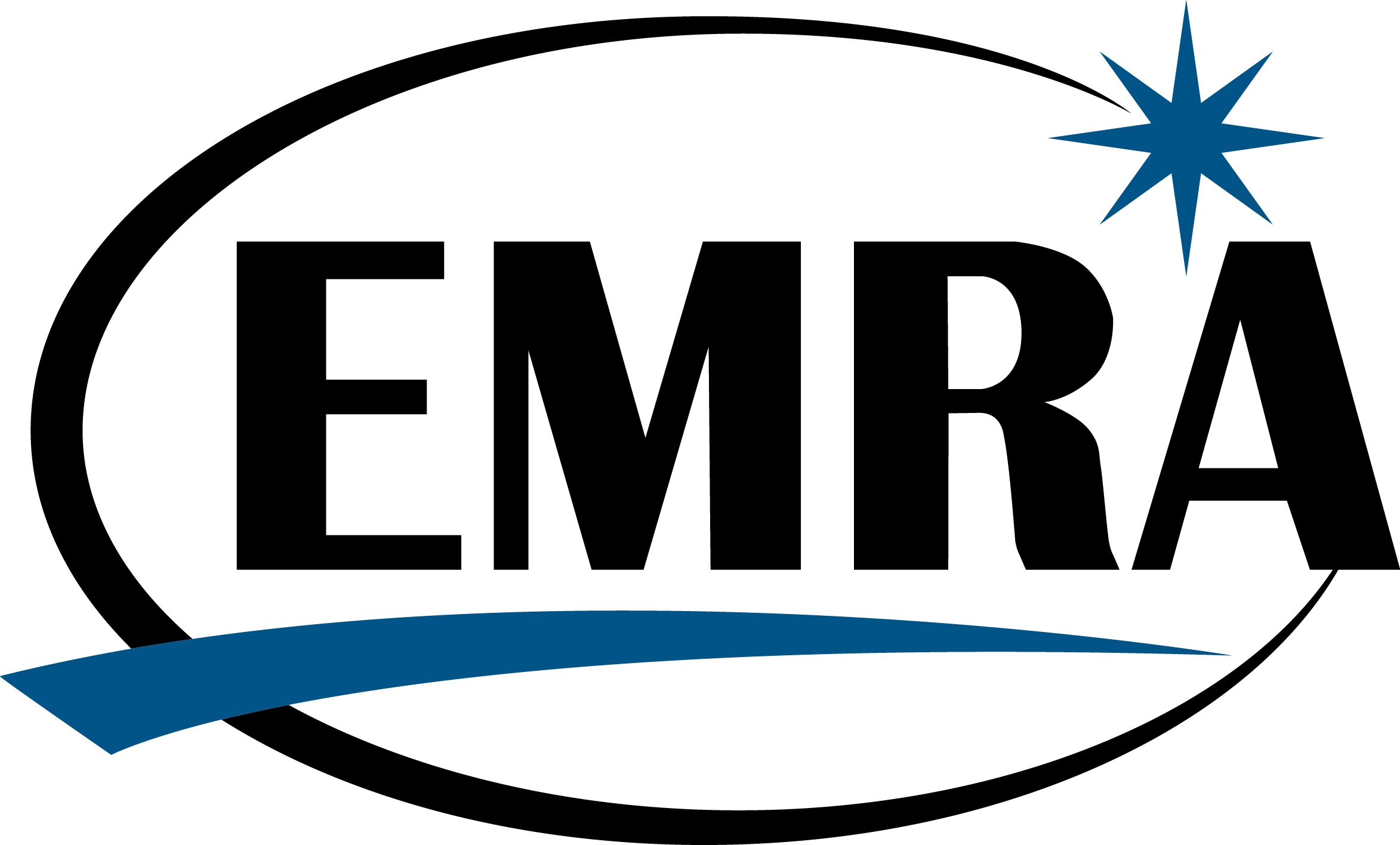2024 Leadership Academy Graduates
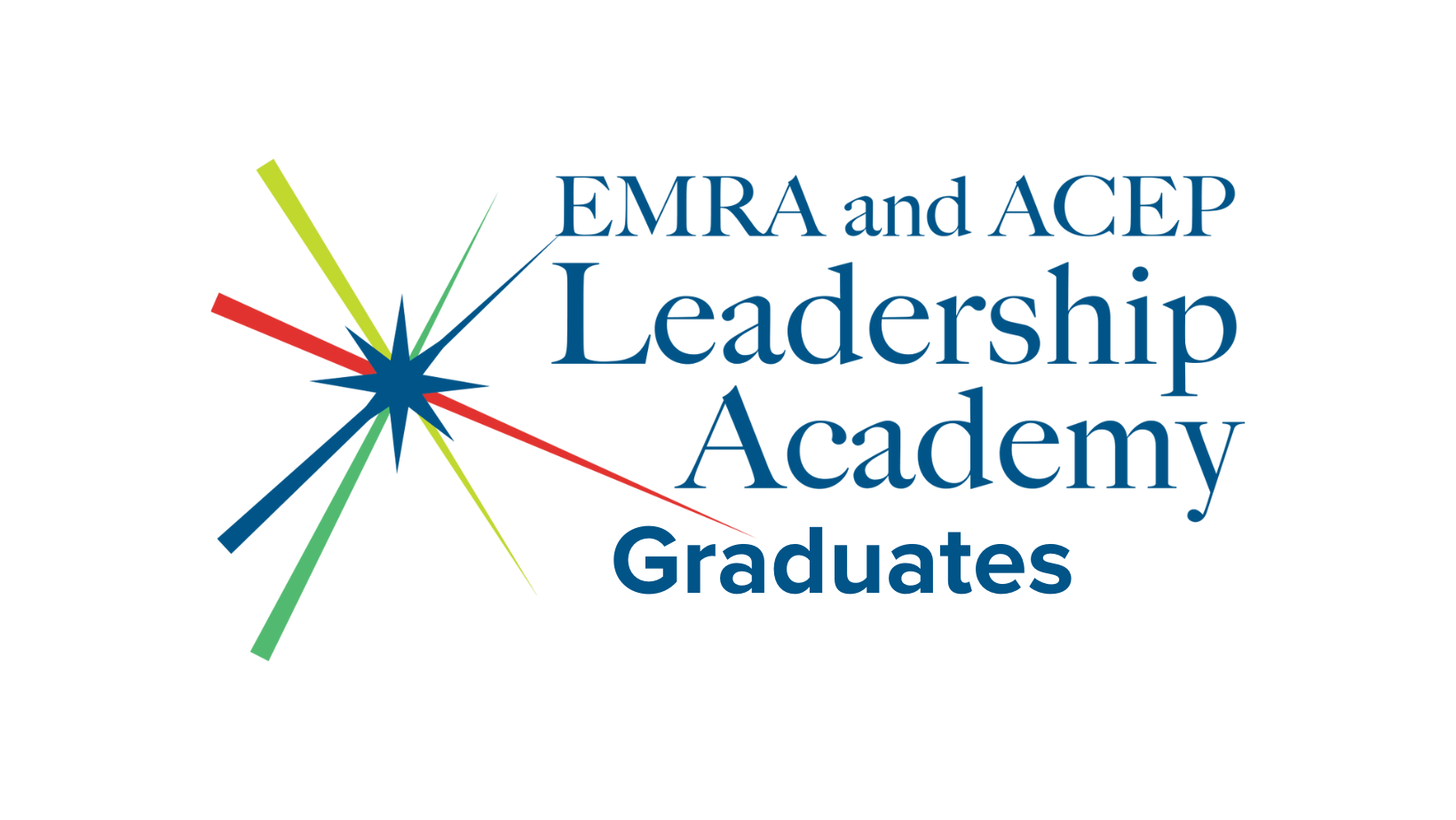
Erin Baker, M.S., D.O., Leadership Academy Graduate 2024
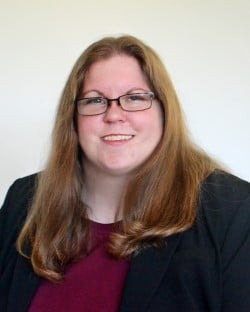 Program: University of Florida - Jacksonville
Program: University of Florida - Jacksonville
Capstone Project: Emergency Medicine Blueprints:
A Business Curriculum for the Developing Physician
A 4-part lecture series focused on high yield topics outside of medicine all doctors should know. Catered to Emergency Medicine residents, but applicable to all specialties. The curriculum is designed to be built into didactic curriculum as 30 minute to 1 hour sessions quarterly.
Karimah Best, MD, Leadership Academy Graduate 2024
 Program: Vassar Brothers Medical Center
Program: Vassar Brothers Medical Center
Capstone Project: For my project, I created a standardized and sustainable patient hand-off template to be used amongst residents in the emergency department. The goal was to allow for efficiency, while ensuring continuation of high-quality patient care and prioritize safety. I created a template following suggestions from I-PASS, SBAR, and Safer Sign-out Model. I incorporated information I thought would be helpful based on how our emergency department operates. Ultimately, hand-offs are a part of the specialty and bringing standardization to my program can help to avoid faulty handoffs.
Kyle Cohen, DO, NRP, Leadership Academy Graduate 2024
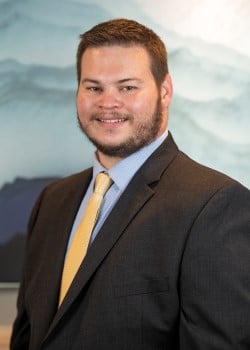 Program: University of Alabama at Birmingham
Program: University of Alabama at Birmingham
Capstone Project: Development of a resident education track in simulation.
With the increasing use and importance of simulation in emergency medicine, I worked with the simulation faculty to develop a curriculum that allows residents to further understand the workings of simulation. One component of the track is the completion of two in house simulation courses that emphasize how simulation is run and how a case is developed. Then, the resident can choose to develop and run an immersive sim case with the assistance of the sim faculty, or conduct a research based scholarly activity. Finally, the resident will be an integral part in simulations for the rotating medical students.
Alex Fenn, MD, Leadership Academy Graduate 2024
 Program: University of North Carolina
Program: University of North Carolina
Capstone Project: I am currently a first year Clinical Informatics Fellow at the University of North Carolina (where I also completed my ED residency!). Combining my ED training as well as my interest in informatics, I worked on an interdisciplinary team with the UNC Information Services Division to create a curriculum regarding providing ED-specific EHR training to ED residents. This involved both initial training in how to most effectively use the EHR for incoming interns as well as specific sessions regarding EHR personalization and efficiency to the entire ED residency.
Adam Huynh, MD, Leadership Academy Graduate 2024
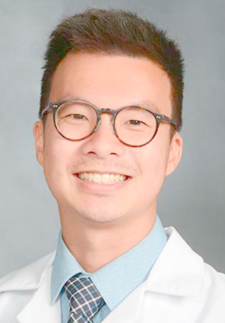 Program: New York Presbyterian Cornell and Columbia
Program: New York Presbyterian Cornell and Columbia
Capstone Project: Currently working on collecting trauma data and procedure numbers from our clinical sites to better characterize/quantify the breadth and depth of procedures that emergency medicine residents are exposed to.
Dazi Irving, MD, Leadership Academy Graduate 2024
 Program: Nuvance Health Emergency Medicine
Program: Nuvance Health Emergency Medicine
Capstone Project: I am working on a QI project addressing the impact of shift scheduling on burn out, resident wellness and work-life balance. I am part of a residency program that recently converted from a solely 12-hour shift model to a hybrid model including 8 hour and 10 hour shifts. These changes have improved wellness overall, however residents continue facing challenges such as disruption of circadian rhythm, less days off in a row as they are required to spend more days working in the ED to meet hour requirements, increased number of sign-outs at the conclusion of shorter shifts. This QI project utilizes surveys measuring overall resident satisfaction and impact on clinical knowledge. It discusses small changes to our current hybrid model and how that would further affect resident satisfaction.
Jacqueline King, MD, Leadership Academy Graduate 2024
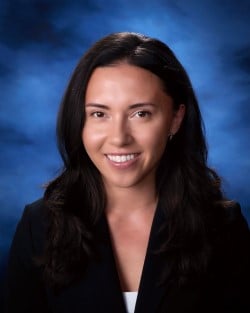 Program: ChristianaCare
Program: ChristianaCare
Capstone Project: For my capstone project, I served as the resident representative on the Claims Advisory Group at my institution. The group discusses claims and/or lawsuits that are preparing to go to trial or are being recommended for settlement. The group helps inform the decision as well as the settlement authority, for those cases determined to be ones to settle. The committee includes the Chief Physician Executive, CFO, CNO, COO, General Counsel, Deputy General Counsel, Chair of the Department of Surgery, Chair of OB/GYN, and Chair of Medicine. The meeting is run by the VP of Risk Management.
Before Leadership Academy, I’m not sure I would have pursued this kind of opportunity for myself. Like many others, I struggle with imposter syndrome and wonder what I could contribute if given a seat at the table. Reflecting on leadership felt particularly meaningful through the end of medical school as I transitioned to residency. It’s been a grounding and rewarding experience, and I’m thankful to EMRA & our Co-Chairs Kathleen & Olivia.
Austin Miller, DO, Leadership Academy Graduate 2024
 Program: OhioHealth Doctors Hospital
Program: OhioHealth Doctors Hospital
Capstone Project: My project is currently ongoing, as I just started residency last month. I am working to create a "Psychiatric Care Cart" for use in our emergency department. The cart will contain items like stuffed animals, coloring books with dull/non-pointy crayons, and other inherently harmless items to help patients with psychiatric emergencies in the ED (especially those who are on hold for days) feel more comfortable. I plan on making this effort into a QI project that will (hopefully) be replicable in other EDs across our health system depending on the impact it has on patient care.
Aleta Mizner, DO, MPAS, Leadership Academy Graduate 2024
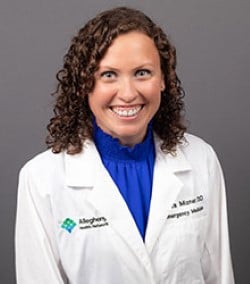 Program: Allegheny General Hospital
Program: Allegheny General Hospital
Capstone Project: The project I completed was one designed to help build positivity in our residency program, demonstrate the importance of a team and provide encouragement to get residency tasks complete. For the project, I helped to implement a "House Cup" Competition. Each resident and some faculty took a brief personality quiz to divide them into one of four houses. The houses are modeled after the Hogwarts Houses but named after prior attendings from my program, that left a lasting impact.
Each house consists of 3 attendings, 2 or 3 PGY3 residents, 2 or 3 PGY2 residents and 3 PGY1 residents. The residents wore the actual "sorting hat" from Harry Potter in front of all residents and their individual teams were announced.
Attached is the scoring rubric for how residents will be able to receive points or lose points. If attendings write a shout out to a resident, with the addition of bonus points, they will be announced at weekly conference. I designed a box and forms, that were placed into the ED, that the attendings can complete on shift and remove weekly for review.
I created a score board to hang in the ED Resident Lounge, the ED Residency Office and the actual ED. I plan to update scores weekly. The winning team will be announced at our annual retreat in February 2025 after the ITE exam. The winning team wins a shift reduction from March to June of 2025 during the ED scheduling block of their choice. A House Cup will also be purchased to place in the residency lounge and the winning team will be written on the trophy.
So far, we have been using the House Cup for one month and the residents are very engaged. They are enjoying the competition aspect while the program has also seen an increase in the number of procedures logged and Rosh Review exam quizzes complete.
This project is a great example how being a leader and implementing a team building activity can increase the moral and provide positive reinforcement for tasks that need completed.
Justin Morin, DO, Leadership Academy Graduate 2024
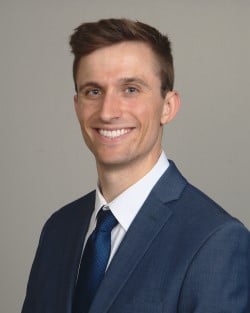 Program: Central Michigan University
Program: Central Michigan University
Capstone Project: Current chief residents, fellow second year residents, new interns, and I collaborated to create “The Meeting Minutes”: simple summaries of our residency didactic sessions. Our intent behind this quality improvement project was to broaden the educational rigor beyond our weekly didactic sessions. We imagined that one page summaries of conference lectures would provide the current and future residents with a framework for lessons learned from our attending speakers, provide a space to praise efforts of co-residents in publications, and disseminate announcements centrally. Although formal evaluation of the effort has not been measured, we included weekly evaluations to ensure utility of this project. Thankfully, we have only received positive feedback from residents and program leadership. Future directions of the project would include evaluation of retention of information from these summaries. Additionally, with so many people involved, we aim to collaborate and create a library of material from lectures.
Aarif Motorwala, MD, Leadership Academy Graduate 2024
 Program: AdventHealth Orlando
Program: AdventHealth Orlando
Capstone Project: We developed a community initiative in which Emergency Medicine residents would rotate at a free primary-care community clinical that provides healthcare follow-up to our primarily uninsured patient population to further expose residents to the social determinants of health that impact patient care in the Emergency Department by broadening residents understanding of the challenges patients face with lack of access to reliable follow-up.
Annie Nyffeler, DO, Leadership Academy Graduate 2024
 Program: University of Nebraska Medical Center
Program: University of Nebraska Medical Center
Capstone Project: Digitalized and organized our ED protocols for the department + Boarding quantitative research to help improve our nursing protocol and understand nursing perspectives.
Ashik Rajak, MBBS, Leadership Academy Graduate 2024
 Program: Kathmandu Medical College Teaching Hospital
Program: Kathmandu Medical College Teaching Hospital
Capstone Project: Initiating an Emergency Medicine Interest Group (EMIG) - I initiated an EMIG formation in my medical school in Nepal in collaboration with the EM residency program extending the same concept across other medical schools and looking forward to extend it country-wide in the days to come. Currently we have over 100 med students as members and we continue to grow. We have hosted community outreach programs, bi-weekly journal clubs, hiking day with case scenario discussions, awareness campaigns and teaching programs for children in local schools.
Angelica Rego, MD, Leadership Academy Graduate 2024
 Program: University of Virginia
Program: University of Virginia
Capstone Project: Development of an assessment and treatment pathway for acute migraine in the emergency department
Nick Rodriguez, MD, Leadership Academy Graduate 2024
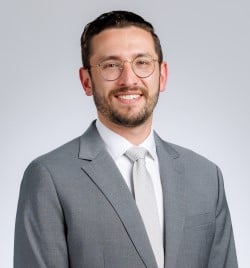 Program: UCSF-ZSFG
Program: UCSF-ZSFG
Capstone Project: Development of an alumni mentorship program for EM-bound students from my graduating medical school. As the inaugural graduating class, much of our mentorship came from faculty or residents from KP San Diego which was physically far from our campus in Los Angeles. The goal of this program was to create an internal mentorship network that pairs recent graduate residents with EM-bound medical students to support and encourage their application to EM.
Alexandra Sappington, DO, MS, Leadership Academy Graduate 2024
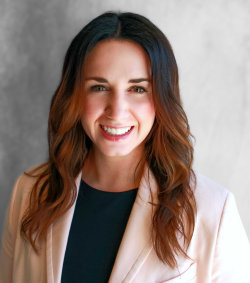 Program: Louisiana State University- New Orleans
Program: Louisiana State University- New Orleans
Capstone Project: 1. Emergency Medicine Residency Website Wellness Pages - A Content Analysis. The COVID-19 pandemic impacted the way medical students seek residency positions. In 2020, ACGME advocated for virtual interviews. Most emergency medicine interviews in 2023 remained virtual and this format will persist for the foreseeable future. Since students are not evaluating programs in-person in most cases, residency websites are crucial for prospective residents. Resident wellness is critical for resident training and important to prospective residents; it follows that programs must be transparent about resident wellness on websites. This study aims to quantify the number of emergency medicine programs with wellness pages on their websites and identify themes portrayed on those pages.
2. Virtual Mentorship Series: I created a monthly mentorship zoom series for medical students who are #EMBound. We covered high yield topics from "Navigating VSLO- How To Apply For Sub-Is" to "What I Wish I Knew Before Going Into EM" which featured a panel of Emergency Medicine Residency Program Leaders.
Melanie Schroeder, MD, Leadership Academy Graduate 2024
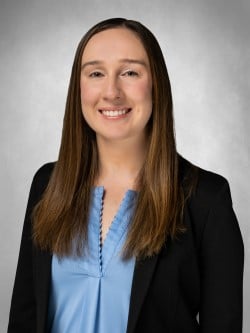 Program: George Washington University
Program: George Washington University
Capstone Project: For my capstone project, I wanted to improve our transitions to clinical shifts in the ED for both new EM interns as well as for off-service interns rotating in the ED. I created a How-To guide for all of these interns including both logistics in our EMR as well as how to prioritize tasks in the ED. I immediately delivered this information to EM interns that I worked with on teaching shifts, but it is now being delivered to all new interns who rotate through our ED as well as some APPs.
Arthur Sieron, MD, MSc, Leadership Academy Graduate 2024
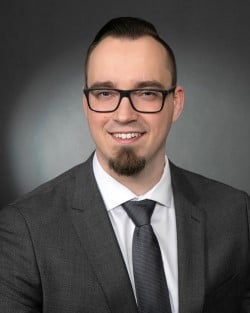 Program: Central Michigan University
Program: Central Michigan University
Capstone Project: I completed a case poster presentation on a patient with SLE with multi-organ involvement.
A 32-year-old female with a history of SLE presented to the emergency department with a 3-day history of fever, myalgias, generalized weakness, shortness of breath, and right-sided chest pain. The patient was afebrile and tachycardic, with a malar rash. Laboratory studies revealed decreased WBCs (2.44 k/cmm), elevated AST (171 IU/L), elevated CK (630 IU/L), elevated ESR (77 mm/hr), and elevated troponin (139 ng/L). ECG was negative, echocardiogram showed trace pericardial effusion and cardiomyopathy with ejection fraction of 40%, and urinalysis showed proteinuria.
Patient was admitted for suspected lupus myocarditis. Anti-nuclear antibody panel was positive with a titer ≥1:1280. The patient’s clinical condition deteriorated, and she developed myositis, lupus encephalitis with aphasia, thrombotic thrombocytopenic purpura, and lupus nephritis. The Systemic Lupus Erythematosus Disease Activity Index 2000 (SLEDAI-2K) was >35, suggesting multi-organ involvement and a need to escalate therapy. The patient was transferred to a tertiary facility and started on high dose cyclophosphamide, hydroxychloroquine, and corticosteroids which resulted in significant clinical improvement.
SLE with multi-organ involvement poses significant morbidity and mortality risk. Mainstay of treatment involves immunosuppressants or biological agents. Disease progression may involve cytopenias, serositis, nephritis, carditis, vasculopathy, and neurological complications including cerebritis, meningitis, polyneuropathy, seizures, and psychosis. Lupus nephritis and cerebritis are two of the most severe clinical manifestations that require a multidisciplinary approach and aggressive management.
Chris Walsh, MD, Leadership Academy Graduate 2024
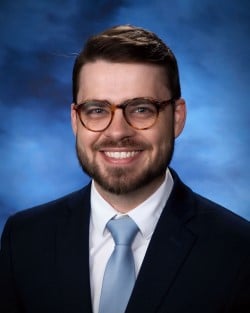 Program: Georgetown / Washington Hospital Center
Program: Georgetown / Washington Hospital Center
Capstone Project: One thing I have learned about leadership throughout this course, and during the beginning few months of residency, is that to be a leader, you have to have an understanding and appreciation for the other roles in the department.
At my program, we have a six week orientation that includes educational lectures, simulation experiences, and a handful of introductory shifts at our two main sites.
For my Capstone Project, I am working with program leadership to implement a day or two during this six week orientation whereby interns are paired with a senior nurse or a senior tech to "shadow" them for a day. In this way, interns will better understand the dynamic within the department, and the roles and responsibilities of other members of the Emergency Department team.
My hope is that the implementation of this shadowing program lays the foundation for interns to understand and appreciate the teamwork that exists within Emergency Medicine, and, importantly, allows them to grow confident in their role as a leader within the department.
